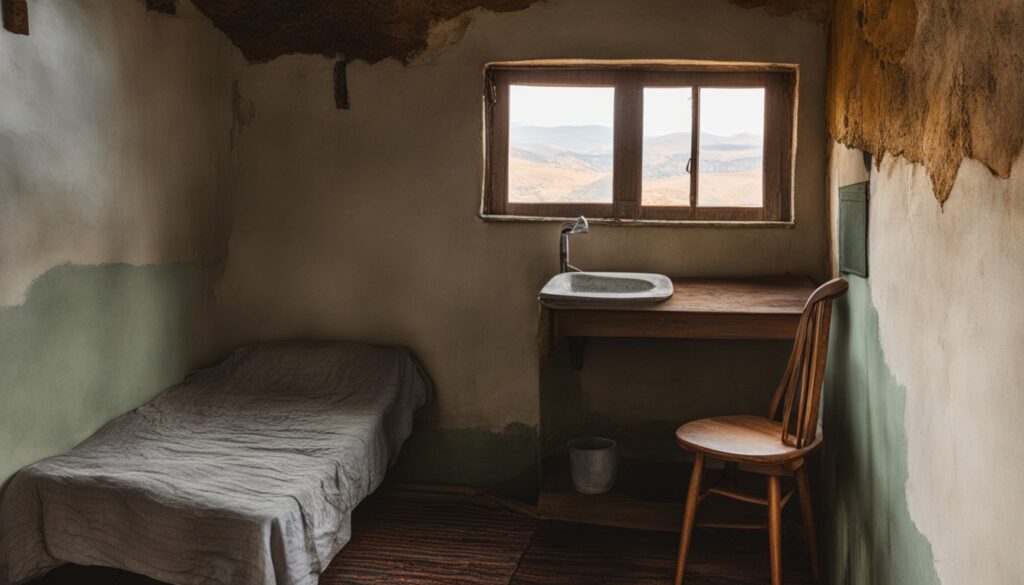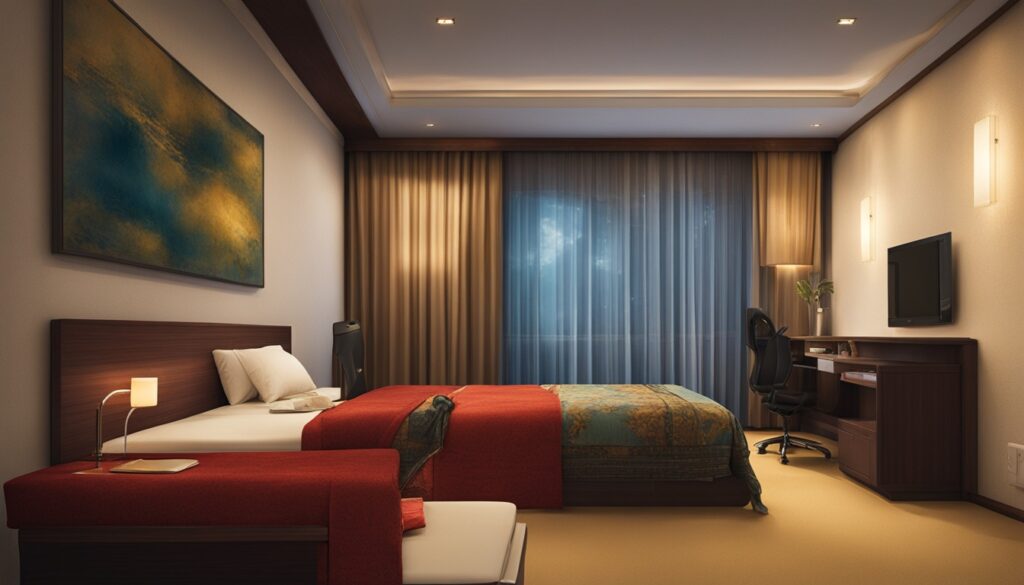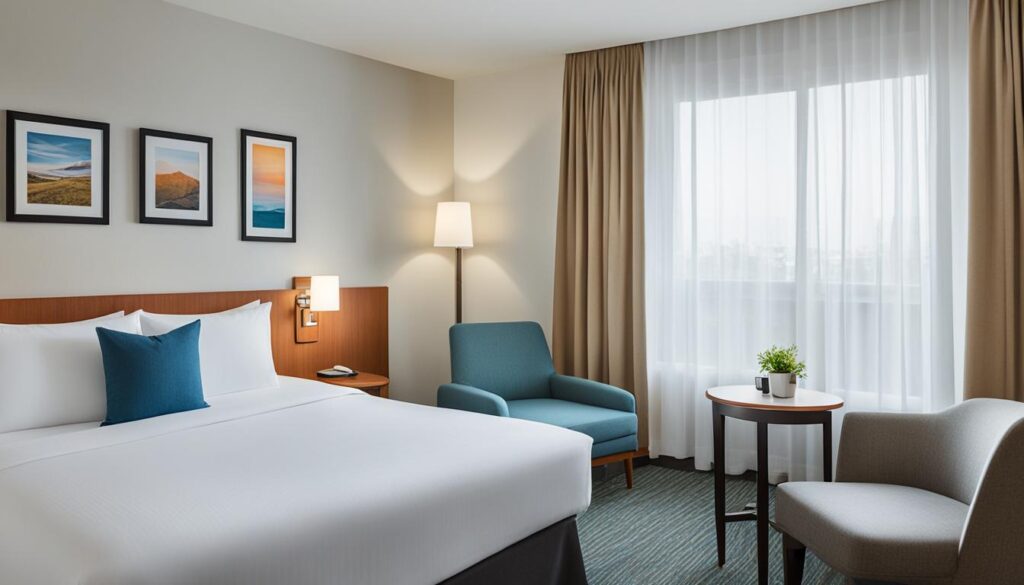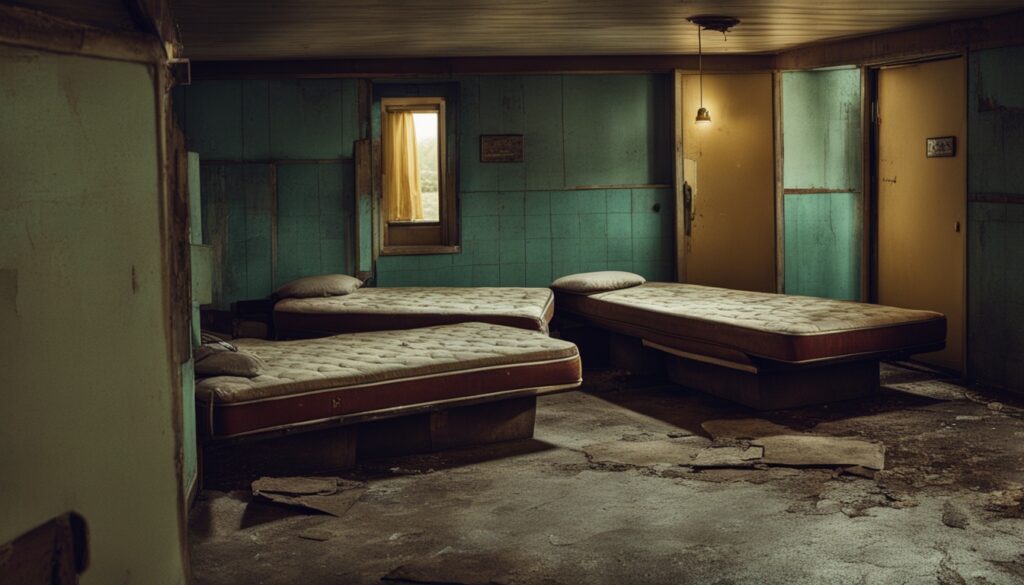Last Updated on: 22nd July 2024, 01:01 pm
When navigating the complexities of hotel accommodations, many travelers need clarification about the meaning and designation of hotel star ratings. These ratings are a system designed to evaluate the various amenities and features a hotel offers, helping guests choose the best fit for their stay and budget. The rating classification typically ranges from 1 to 5 stars, with a 1-Star Hotel providing the foundational requirements of a bed and bathroom1. In the hospitality industry, these evaluations assist in comparing the services of different hotels.
A noteworthy distinction arises within the hospitality industry: American hotel star rating systems rate hotels out of 5 stars, while European systems rate them out of 4 stars12. This discrepancy in rating systems necessitates a nuanced understanding for travelers exploring options across various regions. Although 1-Star Hotels are synonymous with basic needs and cost-effectiveness, they do not necessarily equate to a lack of cleanliness or safety. Essentially, star ratings cater to varying customer requirements, from a simple overnight stay to an extravagant experience1.
Key Takeaways
- Hotel star ratings help guests choose the best fit for their stay and budget1.
- American hotel star ratings go up to 5 stars, while European systems max out at 4 stars12.
- 1-Star Hotels offer basic accommodations like beds and bathrooms1.
- Star ratings cater to various customer needs, from budget stays to luxurious experiences1.
- Despite being basic, 1-Star Hotels do not imply a lack of cleanliness or safety.
Introduction to Hotel Star Rating Systems
The system of hotel star ratings is fundamental in defining the caliber of services, amenities, and the overall quality available at hotels. The evaluation system typically spans from one to five stars, with each increment signifying an elevated level of luxury and service3. However, these classifications are not universally standardized, which results in significant regional differences in hotel ratings.
Overview of Hotel Star Ratings
Hotel ratings are an invaluable tool for both travelers and hoteliers. For instance, in Australia, a one-star hotel provides basic, no-frills accommodation, whereas a two-star hotel offers modest comfort and limited amenities3. A three-star hotel raises the standard with above-average accommodation and a diverse range of amenities, while four-star hotels boast high-quality amenities and services3. At the pinnacle, five-star hotels epitomize luxury, with top-tier amenities and exceptional service3. Each hotel is evaluated based on over 200 criteria to assign its star rating, illustrating the comprehensive nature of these assessments3.
Differences Between Rating Systems in Various Regions
There are distinct differences in how hotel star ratings are assigned in different parts of the world. For instance, the American hotel rating system awards hotels up to five stars, with even one-star hotels providing more than just the essential amenities1. Companies like AAA and Forbes Travel Guide are known for their evaluations in North America and globally3. On the other hand, the European Hotel Star Rating System typically caps at four stars, with entities like the Hotelstars Union orchestrating these ratings1. Such variances can cause confusion among travelers, particularly when comparing a four-star European hotel to a five-star American hotel.
Numerous organizations across the globe, including AA in the UK, DEHOGA in Germany, TGCSA in South Africa, MICHELIN Guide worldwide, and JTB in Japan, are responsible for assigning these star ratings3. Notably, London holds the record for the most five-star hotels globally, with 75 elite establishments, followed by Dubai and New York with 61 and 59 respectively4. The disparity in both the rating mechanisms and the number of high-tier hotels in diverse regions underscores the importance of understanding local rating systems.
| Rating System | Regions | Max Stars | Examples |
|---|---|---|---|
| American Hotel Rating System | North America, Globally | 5 | AAA, Forbes Travel Guide |
| European Hotel Star Rating System | Europe | 4 | Hotelstars Union |
| Other Global Systems | UK, Germany, South Africa, Japan | Varies | AA, DEHOGA, TGCSA, JTB |
What is a 1-Star Hotel

When it comes to what is a 1 star hotel, well 1 Star Hotel is typified by its provision of basic lodging for travelers, encompassing a room with a bed and private bathroom. These accommodations fall at the starting point of the hotel rating spectrum, which ranges from 1 to 5 stars in the U.S.14. Primarily, 1-Star Hotel accommodations offer the essential needs like a bed and a bathroom, often without additional amenities and services1.
In the context of the hospitality industry, these establishments are frequently individually owned, which contributes to a more personal yet minimalistic atmosphere. Typically, 1-Star Hotels operate with limited staff services, focusing on providing budget-friendly options for travelers. These hotels are usually conveniently located near dining venues, and sometimes feature snack vending machines on the premises. Such strategic positioning makes it easier for guests to find nearby food options without the need for an on-site restaurant.
Despite their simplicity, 1 Star Hotel accommodations fulfill the essential requirements for guests. They provide a cost-effective choice for those seeking budget-friendly lodging without the extra frills of higher-starred properties. This makes them an excellent option for short-term stays where basic comfort and efficient service are prioritized over luxury. Whether you are a student traveling on a budget or a business professional needing just a night’s rest, 1-Star Hotels offer a practical and economical lodging solution.
Characteristics and Amenities of a 1-Star Hotel

1-Star Hotels are designed to offer travelers basic 1-Star Hotel accommodations, ensuring essential needs are met with limited amenities. These establishments typically provide a bed and a bathroom as fundamental features, meeting the modest expectations associated with this rating14. Understanding these characteristics helps guests make informed choices when seeking an economical yet functional stay.
Basic Accommodations
In terms of basic 1-Star Hotel accommodations, guests can expect a straightforward setup. A typical room includes a bed, a private bathroom, and occasionally a television or phone. These accommodations emphasize cost-effectiveness and functionality, providing just enough to ensure a comfortable stay without unnecessary luxuries.
Limited Services and Amenities
These hotels are hallmarked by limited amenities and sparse services. Housekeeping is usually conducted between guests rather than on a daily basis, and reception desk hours may be limited. While this may appear restrictive, it ensures that operational costs remain low, allowing for more budget-friendly pricing14.
Accessibility to Nearby Locations
Accessibility plays a crucial role in the appeal of basic 1 Star Hotel accommodations. Despite offering limited amenities on-site, these hotels are often strategically placed near public transportation, dining options, and other conveniences, providing essential needs for travelers. Proximity to nearby dining options and other necessary services makes these hotels a practical choice for those seeking functional, budget-friendly stays.
Benefits of Choosing a 1-Star Hotel

Choosing a 1-star hotel can be a strategic decision for many travelers. These establishments simplify the travel experience by focusing on core amenities. Here’s a closer look at why opting for a 1-star hotel might be the perfect fit.
Cost-Effective for Budget Travelers
1-star hotels are an excellent choice for those seeking cost-effective lodging. Offering only the essential accommodations such as a bed and a bathroom, they keep costs minimal by omitting luxurious extras that many budget travelers can do without1. This makes them an attractive option for those prioritizing budget travel while still wanting a comfortable place to stay.
Meeting Essential Needs for a Short Stay
For individuals requiring short stay accommodations, like a business trip or a quick overnight layover, a 1-star hotel is an ideal match. These hotels deliver exactly what is needed—no-frills, essential needs met in a straightforward manner. Without the distractions of excessive amenities, guests can enjoy a peaceful and efficient stay, making it an excellent choice for focused short-term visits1.
Understanding the core offerings of 1-star hotels allows travelers to make informed choices that align with their financial goals and travel plans. They represent a no-nonsense option without sacrificing the necessary comforts required for a decent night’s rest, making them a preferred option for budget travel1.
Examples and Reviews of 1-Star Hotels

Guest feedback often provides enlightening perspectives on the realities of staying at 1 Star Hotels. By delving into these reviews, one can gain valuable guest insights into the practical and straightforward nature of these accommodations. These reviews are pivotal in dispelling common misconceptions about 1-star accommodations, showing that practical comfort and cleanliness can be achieved without luxury.
Insights from Guest Reviews
Many 1-Star Hotel reviews highlight the surprising cleanliness and comfort offered by these establishments, which often surpass initial expectations. Travelers frequently mention the satisfactory conditions of the rooms, despite the minimal amenities, which include only a bed and a bathroom in most cases1. Furthermore, real traveler experiences have shown that these hotels, particularly in urban areas, provide a cost-effective lodging option within easy reach of prime locations and essential conveniences.
Common Misconceptions
One of the biggest misconceptions about 1-Star Hotels is that they inherently provide poor service and unclean environments. However, this is often not the case as many establishments maintain high cleanliness standards and basic yet satisfactory accommodations. Although they lack amenities such as televisions or phones in rooms1, many guests find these omissions negligible compared to the benefits of strategic locations and affordable pricing. Furthermore, real traveler experiences illustrate that while these hotels do not provide luxury, they fulfill the essential needs of budget travelers, often exceeding expectations in terms of service and convenience.
In understanding the nuances presented through guest insights and 1-Star Hotel reviews, it becomes apparent that these accommodations serve a significant niche in the hospitality industry. They cater to those looking for practical and budget-friendly options without compromising on the basics of comfort and security, challenging the common misconceptions about 1-Star Hotels.
Conclusion
Understanding 1-Star Hotels is crucial for simplifying hotel accommodations and making informed travel choices. These hotels, such as Motel 6 and some independent inns and motels, typically offer small- to medium-sized rooms with basic amenities like a telephone and television5. This makes them ideal for travelers seeking budget-friendly options without needing luxury frills.
Given the diverse rating systems, it’s important to note that in the United States, hotel ratings are based on popular opinion, similar to movie ratings, whereas countries like Spain and Italy have government-controlled hotel ratings with specific laws for each star level5. This regional variation underscores why travelers should refer to specific rating guides when comparing accommodations across different places.
By comprehending the nuances of different hotel ratings, consumers in the hospitality marketplace are better equipped to make choices that align with their budget and accommodation needs. A 1 Star Hotel, while modest, meets the essential requirements, ensuring that travelers enjoy a comfortable and convenient stay. For more insights into the hotel star rating system, explore this detailed overview.
FAQ
What is a 1-Star Hotel?
What are the common characteristics of a 1-Star Hotel?
What amenities can I expect at a 1-Star Hotel?
How do hotel star ratings work?
Are there differences in hotel star rating systems across regions?
What makes a 1-Star Hotel budget-friendly?
Are 1-Star Hotels safe and clean?
What can I learn from guest reviews of 1-Star Hotels?
Why should I choose a 1-Star Hotel for a short stay?
How do 1-Star Hotels fit into the wider hospitality industry?
Source Links
- https://www.webstaurantstore.com/blog/3566/hotel-star-explained.html
- https://www.immihelp.com/hotel-star-rating-system-in-america-explained/
- https://www.siteminder.com/r/hotel-star-rating-systems/
- https://www.investopedia.com/financial-edge/0410/navigating-the-hotel-star-system.aspx
- https://study.com/learn/lesson/hotel-star-ratings-system-history-examples.html
Aparthotel Glossary

As a passionate, global-thinking Real Estate Investor I am constantly looking for the best opportunities to invest in Properties. With Aparthotel.com I am building an All-In-One Global Real Estate Platform, where people can analyse, rent or invest in properties. Additionally I help Investors with comparing the best financing options as well as give detailed Consultation on the buying process for Real Estate Investments around the world. I am looking forward to sharing my knowledge on this Website and feel free to reach out to me if you have any questions.

Comments